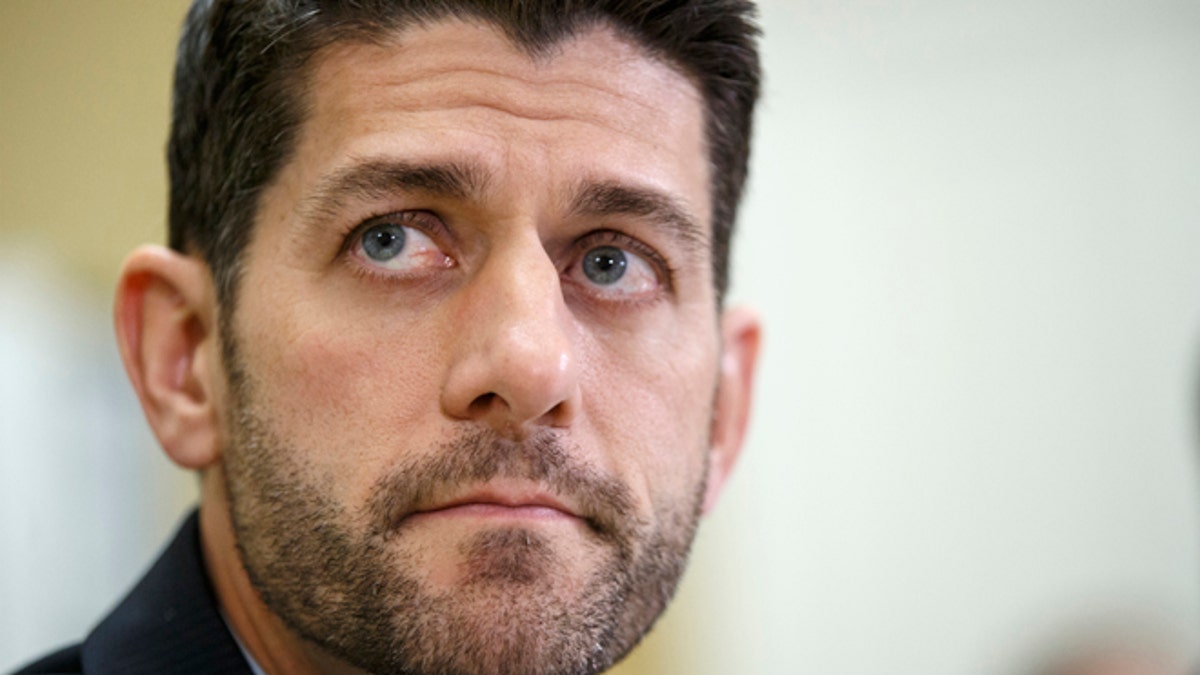
Jan. 7, 2015: House Ways and Means Committee Chairman Paul Ryan, R-Wis., is seen on Capitol Hill in Washington. (AP)
HERSHEY, Pa. – Republican leaders have yet to spell out their strategy for tackling ObamaCare now that they control Congress, and so far have pursued a piecemeal approach -- but are crossing their fingers that a looming Supreme Court case will give them an opening to unravel the law.
GOP leaders huddled this week at a retreat in Hershey, Pa., where the Affordable Care Act was a chief topic.
Wisconsin Rep. Paul Ryan, chairman of the House Ways and Means Committee, on Thursday called ObamaCare a "terrible law" that needs to be replaced because it's "beyond repair."
But Ryan also said he did not have a "timeline" for doing so.
Leaders still say they want to repeal the law. But while the 114th Congress kicked off with major statements on energy and immigration -- the House voted recently to approve the Keystone XL pipeline and reverse President Obama's immigration actions -- proposals pertaining to ObamaCare have been far more modest.
Last week, the House passed a bill that would define a full-time worker under the health law as working 40 hours per week. The law currently uses a lower threshold -- part of a formula that determines which businesses have to provide health insurance to workers. Lawmakers are concerned the provision is leading businesses to cut back hours to skirt the mandate.
And legislation has been proposed in both chambers to repeal the law's 2.3 percent tax on medical devices such as X-ray equipment and artificial joints. The Senate version has bipartisan support and could get a vote in the coming weeks.
Critics of the law say the two provisions hurt the economy and job growth, though President Obama would likely veto both.
Sen. John McCain, R-Ariz., is also trying again to pass a bill that would allow Americans to opt out of the law's individual requirement to buy insurance -- a more sweeping measure.
Republicans still want to do more. Ryan said Thursday that ObamaCare would be replaced with something that gives Americans more choices and lowers costs, improves their access to care and is "truly patient centered" -- an apparent reference to GOP planning for the wild card in all this, the Supreme Court case.
The case, called King v. Burwell, could impact the legality of billions of dollars' worth of subsidies through the law. And Republicans want to be ready with a plan if the ruling goes against the administration.
Plaintiffs argue the law doesn't allow the federal government to offer subsidies to customers in states that don't operate their own insurance exchanges.
The White House has downplayed the case, saying such lawsuits "won't stand in the way of the Affordable Care Act and the millions of Americans who can now afford health insurance because of it." The White House argues the subsidies are being directed in accordance with the "intent of the law."
Earlier Thursday, a Republican aide who attended a session on ObamaCare said the discussions centered on the best strategy in the context of that high court case. The aide said Ryan told fellow lawmakers they must move quickly to show the country that Republicans have a patient-focused response to the case.
Opening arguments are scheduled to start in March with a decision expected in June. A victory for the plaintiffs could have a huge impact on the law, sending enrollment plummeting.
Ryan also updated fellow lawmakers about upcoming ObamaCare deadlines and gave them an overview of the law since it took effect in January 2014 -- including updates on subsidies, exchange programs and cuts to Medicare and Medicaid.
Later Thursday, House Speaker John Boehner emerged from the close-door meetings at the retreat to echo Ryan's remarks.
"Our challenge, our opportunity is to pass common-sense solutions ... that repeal ObamaCare and replace it with patient-centered reforms that will help our constituents have better access to high-quality health care in America," he said at a joint press conference with Senate Majority Leader Mitch McConnell.
Earlier this year, McConnell made clear that Congress will vote on either repealing or "taking out pieces" of ObamaCare, but he and fellow senators had little to say at the retreat about a unified strategy.
To be sure, the GOP Senate caucus' most conservative members will be pushing for full repeal.
Texas Sen. Ted Cruz, a potential White House candidate, said on Monday that Republicans will get "walloped" in the 2016 elections if they ignore voter mandates after midterms that gave them Senate control, which includes the push to repeal ObamaCare.
At least one Republican senator, Bill Cassidy of Louisiana, has proposed legislation to repeal the law.
And this week, the influential conservative group Club for Growth sent a letter to McConnell and Boehner urging them to "continue to be diligent" in their repeal efforts.




